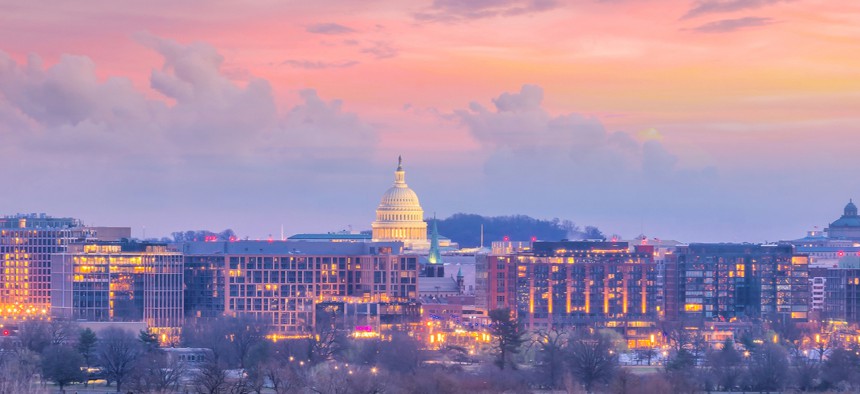
Shutterstock.com
It Pays to Work In the Nation’s Capital
Working in or for the federal government, especially in Washington, looks like a good bet during the pandemic.
While the overall economy has suffered significant COVID-19 effects, the defense industry remains a bright spot. Many companies report they’re ramping up hiring as the government continues to award defense contracts. Pre-pandemic, such jobs may have been viewed as less than ideal compared to other higher paying positions in the private sector. Today, the relative stability of government work is making some heads turn toward the prospect of jobs with or in support of federal agencies.
If you’re considering a job change, what kind of compensation could you expect? ClearanceJobs.com recently released the results of their annual security clearance compensation survey. The average total compensation for 2020 was $96,515. That’s just 3.4% higher than the average total compensation reported by respondents in 2018, the last year a comprehensive salary survey was conducted. The majority of respondents (38%) reported modest increases of 3% or less, and just 16% of respondents reported increases above 5%.
Beyond pay, however, the bigger story was the likelihood of changing jobs—73% of respondents had been at their jobs for less than five years and 81% of candidates reported they were at least somewhat likely to change jobs in the coming year. One quarter of respondents had been at their current employer for less than one year. While the pandemic may make some professionals more likely to remain with their current employer, many defense industry recruiters report their efforts are increasing—with more cleared professionals working remotely, it’s actually easier to reach out and connect about new opportunities.
“Cleared employers continue to feel the effects of a tight candidate marketplace, limited talent pool, and security clearance processing delays,” said Evan Lesser, Founder and President of ClearanceJobs. “Employers are simply unable to inject enough new talent into the industry to keep up with the rapidly increasing number of openings. This is a challenge being faced in both the contract and government community. That’s why we see cleared professionals in high-demand industries like engineering and software development commanding high salaries, particularly in the D.C. Metro.”
Working in Washington Pays
More than half (56%) of cleared respondents come from just a few locations: Virginia; Maryland; California; Washington, D.C.; Texas; and Florida. Location remains one of the greatest predictors of average compensation as well, with Kansas reporting the lowest average compensation, $74,453, and Virginia reporting the highest, $108,030. Across the nation and even across the globe, however, there are positions with or in support of the federal government that often typically pay more than the private sector, with the right combination of skills and experience.
When it comes to showing cleared candidates the money, not all cities are created equal: The Washington, D.C., metropolitan area—the city and its suburbs in Maryland and Virginia—boasts significantly higher salaries than the rest of the country, with total compensation running $18,318 higher. However, the percentage of compensation above base pay is slightly lower in the D.C. metro than the rest of the country—9% versus 12%—which shows companies may be willing to award bonuses or other compensation above base salary to attract workers out of the higher-paying D.C. metro area.
Some industries pay significantly more in the region than elsewhere in the country, however, including business sales (+$39,539); civil engineering ($+36,856); IT-database (+$36,041); IT-QA-test (+$29,496); linguist (+$29,412); IT-software (+$26,715); healthcare/science (+$26,520).
“There are still thousands of open jobs in defense, intelligence, and homeland security,” notes Lesser. “National security employers face some difficult market realities, with the allure of high paying jobs outside of the security space from entities like Amazon’s HQ2.”
Those market realities have helped springboard competition—and compensation—for those IT, business sales and software positions. And while the survey was conducted pre-COVID-19, the compensation benefits of being a healthcare/science professional with a security clearance in the D.C. metro area signals how healthcare can be a national security, as well as community health issue.
Cleared Employees Largely Satisfied
The majority of cleared professionals remain satisfied with their salaries—53% reported being very or somewhat satisfied. Cleared respondents were moderately satisfied with their jobs, with 64% very or somewhat satisfied. Job satisfaction is not clearly correlated with compensation, although those with the highest compensation report the highest job satisfaction. The difference between those who are somewhat satisfied with their jobs and neutral is $7,539.
While 81% of respondents said they were at least somewhat likely to change jobs in the coming year, just 16% reported they were likely or very likely to leave the cleared industry. That means that while national security professionals may be willing to accept another opportunity when it becomes available, they’re not necessarily looking to move to the private sector.
“It’s clear from the majority of respondents who have no plans to leave the cleared industry there is an unquantifiable commitment to the vital work cleared workers do every day,” said Lesser. “It has never been about the money, and always about the mission—and in uncertain times, today’s cleared workforce continues to work tirelessly to ensure the mission gets accomplished—regardless of the location or challenge.”
NEXT STORY: How You Can Avoid ‘Zoom Fatigue’






